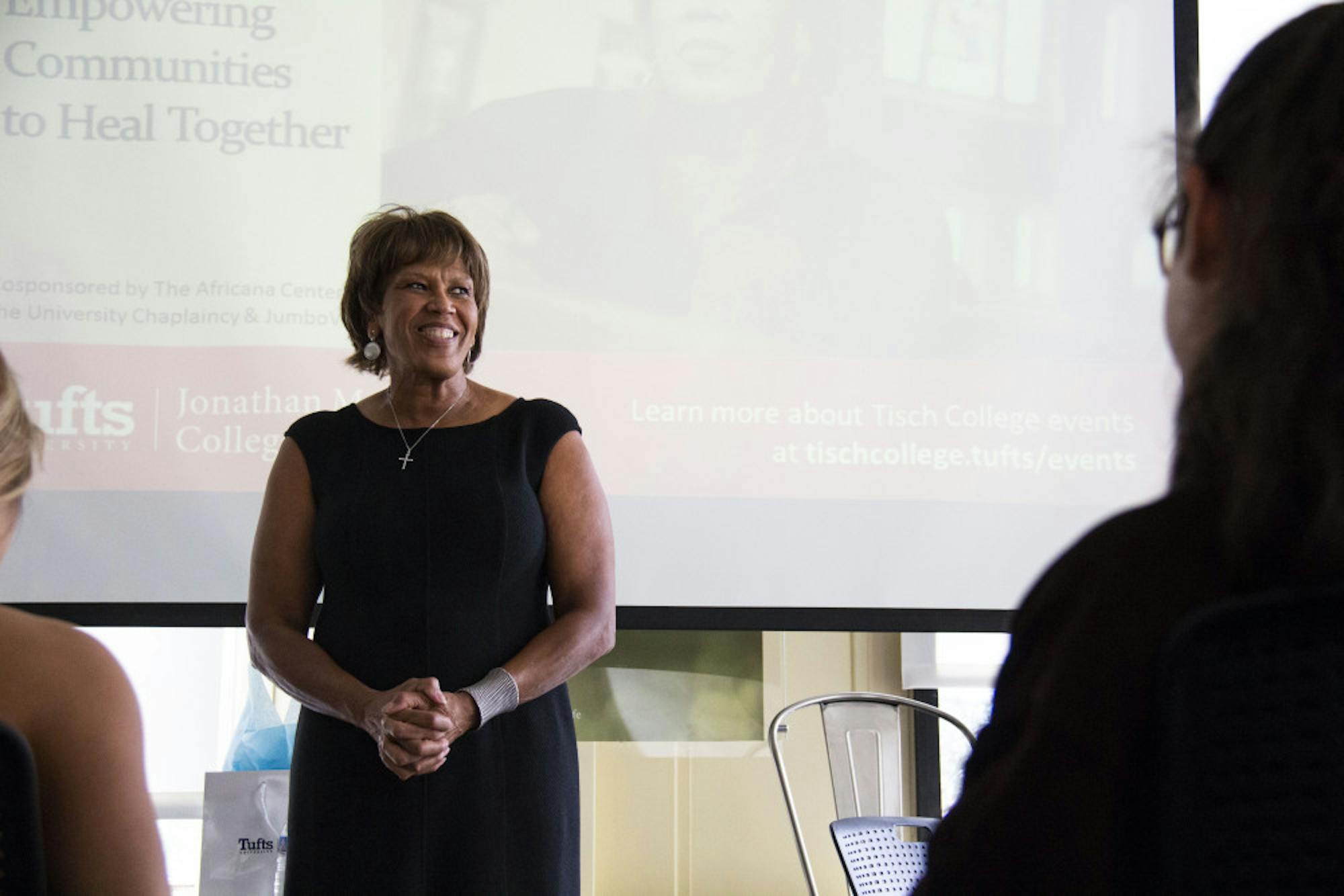Content warning: This article discusses gun violence.
Reverend Liz Walker spoke about her work on trauma and the healing process in local communities on Oct. 9 in the Rabb Room as part of the Jonathan M. Tisch College of Civic Life's Civic Life Lunch. The event, called "Finding Grace After Trauma: Empowering Communities to Heal Together," was co-sponsored by JumboVote, the Africana Center and the University Chaplaincy.
Walker began her career as a journalist, becoming the first African-American television news anchor in Boston. After reporting on a story in 2001 about the slave trade in what is now South Sudan, she was moved to change her career path.
She then attended Harvard Divinity School and now works at the Roxbury Presbyterian Church as a senior pastor. According to Walker, her community of Roxbury experiences large amounts of violence, which has become a tremendous problem. This violence — frequently shootings — has caused large amounts of trauma among the residents of Boston, Walker noted.
“The residual effect of violence is trauma,” Walker said.
The large amount of trauma and high incidence of post-traumatic stress disorder in her community led Walker to establish the Cory Johnson Program for Post-Traumatic Healing. This program is named after Cory Johnson, a man who was killed for unknown reasons in 2010. After his death, Cory’s family tried to heal but were unable to do so without talking about their trauma openly. Walker explained how this program creates a safe space where participants can openly talk about pain.
“Psychological wounds, just like physical wounds, need light and air,” Walker said.
Walker added that by bringing these topics out into the open, participants are able to reflect on these traumas and begin to heal mentally.
The program was created to help those affected by violence, but then expanded to anyone dealing with any form of trauma, according to Walker. She said that there is no registration needed or requirements to meet to join this program, and anyone is welcome.
The Cory Johnson Program has also partnered with the Boston Medical Center in a holistic approach to healing, Walker explained, adding that the program has since been replicated in many other areas.
According to Walker, childcare and a free dinner are offered to attendees of the Cory Johnson Program's events. Walker is also working to develop a program for children to help them deal with trauma caused by violence, adding that trauma is intergenerational and can be passed down from a parent to their children.
Through this program, Walker has learned to find a healthy balance between self-sacrifice and self-care. Walker expressed that this type of program works very well in a religious setting because of the emphasis on sacrifice in religion. Although this work can be emotionally draining, Walker described it as the most rewarding endeavor she has ever embarked on.
Walker has also been able to form her own definition of grace through leading this program.
“Grace is that unearned gift where you don’t know if they will thank you," Walker said. "We need more of that than anything else right now."
Walker explained that each individual action can build towards a better future.
“If you can just do one authentic thing to move the world forward, that counts,” Walker said.
In an interview with the Daily, Jessica Byrnes, program administrator for Tisch College, explained that the Tisch College had been working to bring Walker in as a speaker for some time, but that Walker's work has kept her busy.
“She’d actually been on our short list of speakers for probably a year and a half,” Byrnes said.
According to Byrnes, Tisch College Dean Alan Solomont has close connections with Walker through his involvement in the Boston community; in particular, Solomont served on the Roxbury Presbytarian Church's Lasting Change Committee, a fundraising committee for the Cory Johnson Program, Byrnes explained. This connection between Solomont and Walker helped make this talk possible.
Bronwyn Fulton, a first-year, explained that she attended this event because she is Presbyterian and interested in pursuing social work.
“It’s really inspirational to hear people talk about all the good that they’re doing in the world,” Fulton said.
Liz Walker discusses healing, community trauma at Civic Life Lunch

Community healing activist and former journalist Reverend Liz Walker speaks about finding grace after trauma at a Tisch College Civic Life Lunch in the Rabb Room on Oct. 9.





